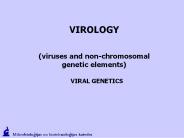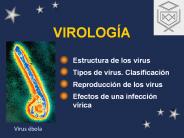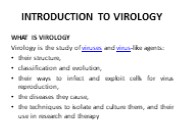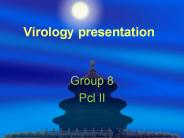Virolog PowerPoint PPT Presentations
All Time
Recommended
Title: Author: aaa Last modified by: jsj Created Date: 11/22/2001 1:12:39 PM Document presentation format: Company: aaa
| PowerPoint PPT presentation | free to view
Title: No Slide Title Author: Indrikis Last modified by: user Created Date: 3/5/2001 7:02:29 PM Document presentation format: On-screen Show (4:3) Company
| PowerPoint PPT presentation | free to download
VIROLOG A Estructura de los virus Tipos de virus. Clasificaci n Reproducci n de los virus Efectos de una infecci n v rica Virus bola GENERALIDADES Se ...
| PowerPoint PPT presentation | free to download
... petechial/purpuric skin rash central nervous system defects 2. Mononucleosis syndrome fever, malaise, atypical lymphocytosis, ...
| PowerPoint PPT presentation | free to view
Detection of viral genomes by nucleic acidamplification methods. Detect and quantify: helpful in diagnosis and treatment follow up e.g reduction in viral load ...
| PowerPoint PPT presentation | free to download
CLASSIFICATION. BASIC STRUCTURE AND MOLECULAR BIOLOGY ... CLASSIFICATION. NUCLEIC ACID. 56. symmetry. icosahedral, helical, complex ...
| PowerPoint PPT presentation | free to download
Virology. Basics of Virology. How are viruses transmitted from host to host? How does a virus ... How does the immune system work against a viral infection? ...
| PowerPoint PPT presentation | free to view
Virology. Virus Families and the Diseases they Cause. Poxviridae ... Codes for all enzymes for transcription and replication of the viral genome ...
| PowerPoint PPT presentation | free to view
VIROLOGY Virus : agen infeksi yang terkecil, yang dapat multiplikasi hanya di dalam sel hidup. Beberapa sifat yang membedakan virus dan m.o lain : berukuran ...
| PowerPoint PPT presentation | free to download
... parasites Viruses are considered nonliving because they cannot reproduce on their own Viruses contain DNA or RNA either of which is double or single stranded ...
| PowerPoint PPT presentation | free to download
VIROLOGY (STUDY OF VIRUSES) A small subcellular form. capable of causing disease. VIRUS: ... (or extra parts of a chromosome) This means that PERHAPS A body can ...
| PowerPoint PPT presentation | free to view
Virology Properties of Viruses Contain a single type of nucleic acid, either DNA or RNA, not both. The DNA and RNA can either be double stranded (ds) or single ...
| PowerPoint PPT presentation | free to download
Virology Lab 6 Definitive Properties of Viruses An infectious, obligate intracellular parasite Viral genome comprised of either DNA or RNA Within an appropriate host ...
| PowerPoint PPT presentation | free to view
VIROLOG A CARACTER STICAS GENERALES DE LOS VIRUS II GENERALIDADES: Los virus son agentes infecciosos que son: Par sitos Intracelulares Obligados.
| PowerPoint PPT presentation | free to download
Virology. Wolfgang Preiser. Christian Drosten. Prepared by Hiko Tamashiro. Part 1. Part 2. Part 3 ...
| PowerPoint PPT presentation | free to view
VIROLOGY (STUDY OF VIRUSES) A small subcellular form that is... VIRUS: ... A Virus is an Intracellular parasite. invades living cells ...
| PowerPoint PPT presentation | free to view
introduction to virology
| PowerPoint PPT presentation | free to download
Three parts of the egg are of use. A The amniotic cavity: ... The Fertile Egg ... dropped away from the shell. membrane. Dermatropic viruses (poxviruses ...
| PowerPoint PPT presentation | free to view
Nipah virus is an enveloped, nonsegmented,negative-stranded RNA ... ????????? Nipah virus. ???????????????????????????????? vero E6 cells ... ???? herringbone ...
| PowerPoint PPT presentation | free to view
Virology-- Chapter 6 Size of viruses Filterable viruses tobacco mosaic virus bacteriophages Wendell Stanley and TMV 1935 found only protein and nucleic acid
| PowerPoint PPT presentation | free to view
Virology Lab 6 Definitive Properties of Viruses An infectious, obligate intracellular parasite Viral genome comprised of either DNA or RNA Within an appropriate host ...
| PowerPoint PPT presentation | free to download
Laboratory virology
| PowerPoint PPT presentation | free to view
General Virology-2 What are viruses ? How do viruses replicate ? What effects do viruses have ? How do viruses change ? What are the consequences of change ?
| PowerPoint PPT presentation | free to view
Title: MSU key messages Author: Suzi Taylor Last modified by: mburrows Created Date: 5/1/2006 9:13:53 PM Document presentation format: On-screen Show (4:3)
| PowerPoint PPT presentation | free to view
Virology presentation Group 8 Pcl II Poliovirus Poliovirus , a highly contagious virus that causes the medical condition polio (poliomyelitis) is a human enterovirus ...
| PowerPoint PPT presentation | free to download
Title: PowerPoint Presentation Author: lesley nicolson Last modified by: Samman Created Date: 10/31/2001 10:27:45 AM Document presentation format
| PowerPoint PPT presentation | free to view
Helical vs Icosahedral Symmetry - Why do most viruses look alike? ... Viral property that varies depending on the host ... Chemical synthesis of poliovirus: ...
| PowerPoint PPT presentation | free to download
Medical Virology. Spring 2005. Reference. Medical Microbiology; Murray ... Principles of Virology:Molecular Biology, Pathogenesis, and Control 2000; Flint ...
| PowerPoint PPT presentation | free to view
Tadpole-shaped. Bullet-shaped. Filament. Shapes of Viruses:Spherical. Shapes ... Tadpole-shaped. Shapes of Viruses :Bullet-shaped. Shapes of Viruses :Filament ...
| PowerPoint PPT presentation | free to view
Virology - Resistance. Anna Maria Geretti. Royal Free Hospital, London ... Evolution towards high resistance and high fitness. Emergence ...
| PowerPoint PPT presentation | free to view
(baby hamster kidney, BHK) ... Titer = 2.4 x 108 pfu/ml. Transformation. loss of contact inhibition ... 15 virus = 1.5 x 104 virus/ml. 1.5 x 104 virus/ml ...
| PowerPoint PPT presentation | free to view
According to Straits Research, the global virology market size was valued at USD 2.71 billion in 2023. It is projected to reach from USD 2.84 billion in 2024 to USD 4.20 billion by 2032, growing at a CAGR of 5.05% during the forecast period (2024–2032).https://straitsresearch.com/report/virology-market/request-sample
| PowerPoint PPT presentation | free to download
Computational Virology. Lectures in. Bioinformatic Studies on the Evolution Structure and Function of RNA-based Life Forms ... Distribution of Retroid Agents ...
| PowerPoint PPT presentation | free to view
Global Virology Testing Market
| PowerPoint PPT presentation | free to download
Virology Module. Summary significant research to date. WNV evolution with time/movement ... Development of vaccine (equine) Mechanisms of invasion ...
| PowerPoint PPT presentation | free to view
equine morbillivirus, Nipah virus (Paramyxoviridae) MODEL AGENT ... Experimental Design for Testing Motif Detection Methods. Blockmaker. Matchbox. Meme. Pima ...
| PowerPoint PPT presentation | free to view
An extracellular form of the viral genome is transported leaf to leaf through ... Viral genes organized and translated like host genes ...
| PowerPoint PPT presentation | free to view
Computational Virology. Lectures in. Bioinformatic Studies on the Evolution Structure and Function ... Does the RT domain of the RdDp share common ancestry ...
| PowerPoint PPT presentation | free to view
According to Straits Research, the global virology market size was valued at USD 2.71 billion in 2023. It is projected to reach from USD 2.84 billion in 2024 to USD 4.20 billion by 2032, growing at a CAGR of 5.05% during the forecast period (2024–2032).https://straitsresearch.com/report/virology-market/request-sample
| PowerPoint PPT presentation | free to download
... mumps Herpes (Type Specific) HIV and other viral markers for the Organ Donor Programs (Eye Bank of BC, ... (zoonoses) Vector-Borne diseases: Lyme disease, ...
| PowerPoint PPT presentation | free to download
INTRODUCTION TO VIROLOGY
| PowerPoint PPT presentation | free to view
"COPY LINK read.softebook.xyz/power/B01EBAP43C | PDF READ | PDF READ DOWNLOAD |DOWNLOAD PDF |PDF | PDF READ ONLINE | PDF DOWNLOAD |READ PDF | READ DOWNLOAD |get PDF Download|Download Book PDF |Read ebook PDF | PDF READ ONLINE } Virology: A Laboratory Manual Kindle Edition "
| PowerPoint PPT presentation | free to download
Structural Virology refers to molecular mechanism that is utilized by viruses which are the smallest self replicating organism to invade the host cells who create an infection. This ensure the progeny virus particles to release in the environment, all while avoiding the host’s immune defense
| PowerPoint PPT presentation | free to download
Introduction to Virology. I. Objectives. What is a virus. How do viruses multiply ... Differences in multiplication due to differences in genome organization ...
| PowerPoint PPT presentation | free to view
Medical Virology Lecture 29 Tasnim Suliman MSc Molecular Virology (student) 2535939@uwc.ac.za What are viruses? Small obligate intracellular parasites Virion Complete ...
| PowerPoint PPT presentation | free to view
... respiratory syncytial virus immune globulin, immune serum globulin for hepatitis A Viral Infections: Prevention and Therapy Blood screening HIV, ...
| PowerPoint PPT presentation | free to download
Introduction to Virology. Lecture Outline. I. Objectives. II. Historical perspective ... F. Class VI: ss( )RNA with dsDNA intermediate. VIII. ...
| PowerPoint PPT presentation | free to view
[PDF] Principles of Molecular Virology 6th Edition Free- Copy URL | gooread.fileunlimited.club/pw23/0128019468
| PowerPoint PPT presentation | free to download
9.4 Quantification of Viruses. Plaque Assay. III. VIRAL REPLICATION. Tailed Bacteriophage Attachment and Penetration. Events During T4 Infection ...
| PowerPoint PPT presentation | free to view
"Copy Link : gooread.fileunlimited.club/pwjul24/1975112601 Fields Virology: RNA Viruses Seventh Edition Now in four convenient volumes, Field’s Virology remains the most authoritative reference in this fast-changing field, providing definitive coverage of virology, including virus biology as well as replication and medical aspects of specific virus families. This volume of Field’s Virology: RNA Viruses, Seventh Edition covers the latest information on RNA viruses, how they cause disease, how they can cause epidemics and pandemics, new therapeutics and vaccine approaches, as provided in new or extensively revised chapters that reflect these advances in this dynamic field.Bundled with the eBook, which will be updated regularly as new information about each virus is available, this text serves as the authoritative, up-to-date reference book for virologists, infectious disease specialists, microbiologists, and physicians, as wel"
| PowerPoint PPT presentation | free to download
Copy Link : gooread.fileunlimited.club/pw23/0898383900 | (PDF) Rabies (Developments in Veterinary Virology, 7) Free Rabies is an ancient disease and a fearsome one. Although it may not have the economic or public health importance of some other infectious diseases, few are so well known or carry the same emotional impact. Mainly transmitted by the bite of an enraged animal, and with practically no hope for recovery among those afflicted, it has provided the substance of stories and legends throughout the ages. The pioneering work of many 19th century workers, culminating in the development of the first rabies vaccines by Louis Pasteur, provided the ground work for the modern era in the study of rabies. Since then, and particularly in the last quarter century, considerable advances have been made in our knowledge of the nature of the infectious agent, its mode of transmission and pathogenetic mechanisms. Yet even today, much remains to b
| PowerPoint PPT presentation | free to download
Obligate intracellular parasites of ... Are not cells; structure is compact and economical ... ability to adsorb determines the host/tissue range of the virus ...
| PowerPoint PPT presentation | free to view
Understanding diversity is the key to understanding viruses. At a ... Viruses are distinct from ... The first electron micrograph of a virus (TMV) was ...
| PowerPoint PPT presentation | free to view
A package of genetic information protected by a protein ... Cytopathology they cause. Cytomegalovirus. Site of isolation. Adenovirus, Enterovirus, Rhinovirus ...
| PowerPoint PPT presentation | free to view


















































![[PDF] Principles of Molecular Virology 6th Edition Free PowerPoint PPT Presentation](https://s3.amazonaws.com/images.powershow.com/10087820.th0.jpg)

![[PDF] Fields Virology: RNA Viruses Seventh Edition Full PowerPoint PPT Presentation](https://s3.amazonaws.com/images.powershow.com/10078675.th0.jpg)
![[PDF] Rabies (Developments in Veterinary Virology, 7) Free PowerPoint PPT Presentation](https://s3.amazonaws.com/images.powershow.com/10095089.th0.jpg)


